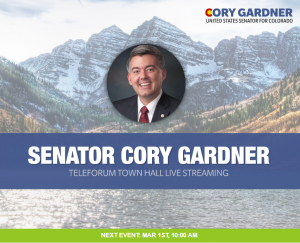Will constituents be excluded from Gardner’s telephone town halls?
Monday, February 27th, 2017 On a new page on his official web site, announcing a series of “telephone town halls,” U.S. Sen. Cory Gardner (R-CO) writes, “To join our conversations, complete the form below and we will call you before each event starts.”
On a new page on his official web site, announcing a series of “telephone town halls,” U.S. Sen. Cory Gardner (R-CO) writes, “To join our conversations, complete the form below and we will call you before each event starts.”
But if Gardner selects specific people who sign up on his website for telephone town halls, he may be breaking U.S. Senate rules.
“[Gardner’s] communications director told me that they and other U.S. Senators have a company that sets up telephone town halls according to senate rules that require participants be selected randomly from voter rolls,” CBS4 political specialist Shaun Boyd reported Jan. 30.
I had no luck locating the rules referenced, and my phone call to Gardner’s office routed me directly to voice mail and was not returned. A call to Vakeo, which apparently operates Gardner’s tele town halls, was not returned.
But a Google search yielded numerous references to the “random” selection of participants on telephone town halls organized by members of Congress, like Sen. Pat Toomey (R-PA).
The selection of participants for Gardner’s town halls, the next of which is set to occur March 1, is important, because Gardner is telling constituents who are demanding an in-person town hall to go to his website and sign up for the telephone variety instead.
“We will add you to the next tele-town hall,” Gardner told a woman last week, as shown in a video she posted online. “It’s no problem” (in the top video here at 1 min 15 seconds).
But it is a problem if participants for the telephone town halls are selected at random, because this would exclude some.
Since Trump’s election, Gardner has relied on secretive or expensive private meetings and one telephone town hall to reach his constituents, and he has apparently abandoned in-person town halls. Last week, Gardner ignored a reporter’s question, put to him five times in a row, about whether he’d hold an in-person town hall.
Constituents who sign up to be on Gardner’s telephone town-hall list, must agree to this statement, as written on Gardner’s telephone town-hall page, which was apparently added recently to his website.
By clicking the button below, I provide my signature expressly authorizing Senator Cory Gardner and Vekeo to contact me and send me information regarding their office, telephone meetings, upcoming events or other opportunities via live, automated or prerecorded calls, text messages or emails to my telephone number and email address that I entered above. I also agree to the Terms of Use and Privacy Statement. In compliance with applicable ethics rules, we can only accept telephone meeting registrations from constituents of Senator Cory Gardner’s District. I represent that I am a resident in Senator Cory Gardner’s District. I understand that my telephone service provider may impose charges for these contacts and that I can revoke this authorization at any time (see the “Events, Sign-Ups and Cancellations” section of the Terms of Use for more details).
“I want to hear from you,” Gardner wrote on the telephone-town-hall page of his website. “Get your questions ready and join me for live, interactive events.”
But unless Gardner’s communications director gave inaccurate information to CBS4, Gardner won’t necessarily be calling you–unless you’re selected at random.


